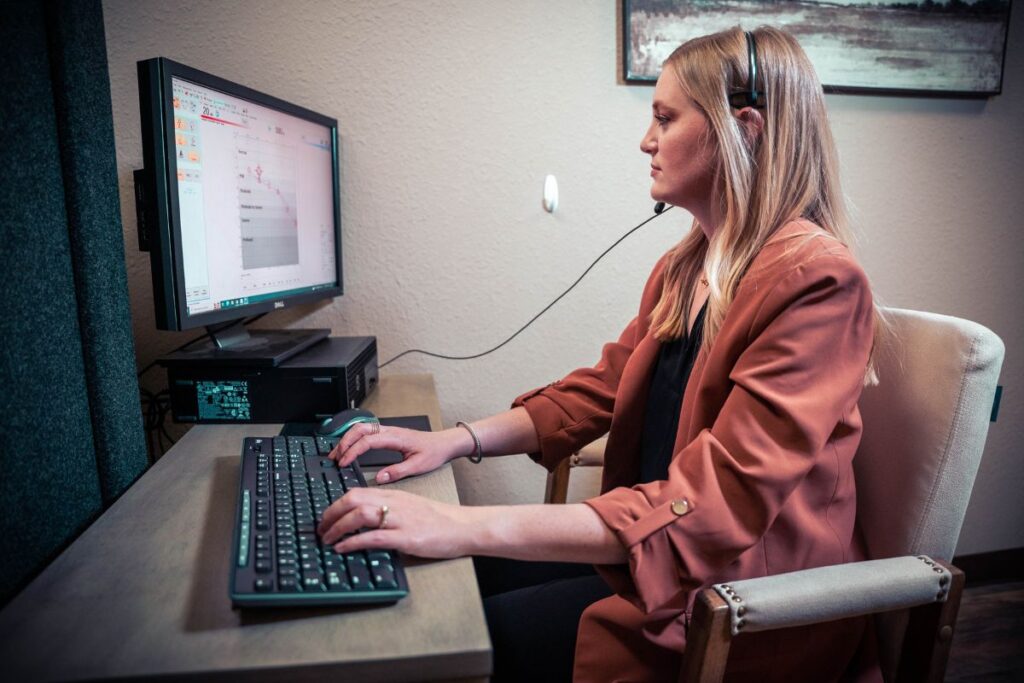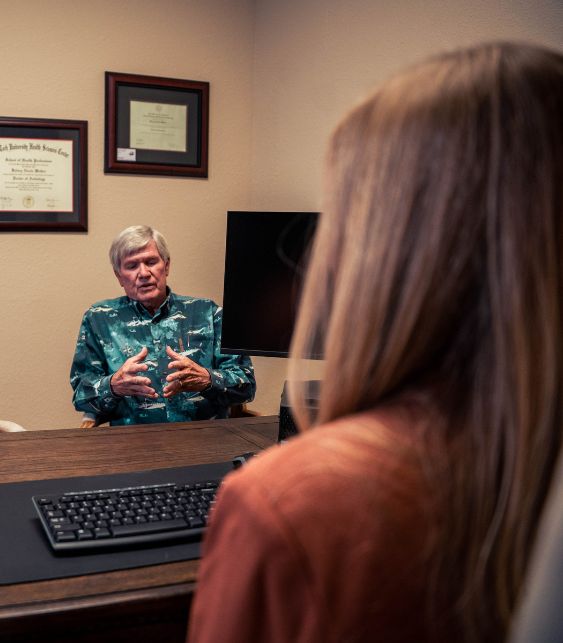Abilene Audiology Co. provides tinnitus evaluations in Abilene, TX and nearby communities.
Tinnitus is the perception of sound in the absence of an external source. The sound can manifest as a low-pitched or high-pitched ringing, buzzing, hissing, or humming. Tinnitus evaluations are a set of tests or questionnaires used to diagnose tinnitus.
This condition can be caused by various factors, from age-related hearing loss, exposure to loud noises, earwax accumulation, or head trauma. In some cases, the cause of tinnitus cannot be determined, shifting the focus to managing the symptoms to prevent the condition from affecting the patient’s quality of life.
Proper evaluation and diagnosis are key in managing tinnitus. Detailed tinnitus evaluations performed by an audiologist can help identify the underlying cause of tinnitus, rule out underlying medical conditions, and determine the appropriate course of treatment.
What Should You Expect During A Tinnitus Evaluation?
Tinnitus evaluations are important in diagnosing and determining the underlying cause of tinnitus.

During a tinnitus evaluation, audiologists aim to accomplish the following:
- Investigate the underlying cause of tinnitus symptoms.
- Determine if the category of tinnitus (subjective, objective, vibratory, non-vibratory)
- Evaluate how tinnitus is affecting a patient’s speech reception.
- Assess whether the patient is experiencing sound sensitivity (hyperacusis)
- Assess the loudness and frequency of the tinnitus sounds.
Physical Examination for Tinnitus
During a physical examination for tinnitus, an audiologist or healthcare professional will inspect the ears for any visible signs of infection or damage, as well as ear wax blockages or fluid in the middle ear.
Tinnitus Diagnostic Tests
Audiologists usually perform a special high-frequency test to help determine the intensity and pitch of the tinnitus. For most individuals, tinnitus has a consistent sound. Matching this sound to a frequency during a hearing test can help healthcare providers a better understanding of how tinnitus is affecting hearing and brain function.
Other Audiologic Measurements for Tinnitus
Other hearing tests that can be used to diagnose tinnitus include loudness matching, pitch masking, and minimum masking level.
Doctors must also rule out any medical conditions typically associated with tinnitus, such as high blood pressure, Meniere’s disease, or temporomandibular joint (TMJ) disorder.
What’s next after a tinnitus evaluation?
After a tinnitus evaluation, a treatment plan will be created based on the results. Treatment options for tinnitus may include hearing aids, medication adjustment, sound therapy, noise maskers, counseling, and, in some cases, surgery.
Early and proper diagnosis is important for effective management of tinnitus.
Tinnitus Management and Treatment | Abilene, TX
While there is no exact cure for tinnitus, there are various management and treatment options that can help alleviate symptoms and enhance daily functioning.
The appropriate management and treatment options for tinnitus vary depending on the underlying cause and severity of the condition.
Below are some of the most recommended treatment methods for tinnitus:
Hearing aids
Hearing aids may be recommended as a treatment option for individuals with tinnitus who are also diagnosed with hearing loss. Hearing aids can help amplify external sounds and reduce the perception of tinnitus. We are also able to provide sound therapy through the hearing aids in the form of masking sounds and fractal tones.
Sound therapy
Sound therapy involves the use of external sounds to mask or minimize the perception of tinnitus. Sound therapy includes sound generators, white noise machines, and hearing aids that are programmed to produce sounds tailored to efficiently mask a person’s specific tinnitus perception.
Cognitive-behavioral therapy (CBT)
This treatment option focuses on changing the negative thought patterns and behaviors associated with tinnitus. CBT can help patients with tinnitus manage their symptoms and improve their quality of life by teaching relaxation techniques and coping strategies.
Other treatments for tinnitus
Other treatment options may include medications, such as antidepressants and antianxiety drugs, that can help minimize the symptoms associated with tinnitus.
It is essential to work with an audiologist and other healthcare professionals to create a personalized treatment plan for tinnitus.
Classifications of Tinnitus
Tinnitus can be classified in different ways based on various factors such as the underlying cause, the type of sound perceived, and the duration of symptoms.
One classification system for tinnitus divides it into two broad categories: pulsatile and non-pulsatile tinnitus. Another classification system divides tinnitus into 4 categories.
Pulsatile Tinnitus
Pulsatile tinnitus is caused by the involuntary contractions of muscles in the ear or head. The sounds produced are typically described as a pulsing or low-frequency rumbling.
Non-pulsatile Tinnitus
Non-pulsatile tinnitus is associated with abnormalities in the auditory system, such as damage to the auditory nerve or hair cells in the inner ear. The sound can be a high-pitched ringing or buzzing.
Another classification system for tinnitus distinguishes between objective and subjective tinnitus.
Subjective Tinnitus
This is the most common type of tinnitus, accounting for more than 95% of cases. The sound is only heard by the person experiencing the tinnitus and cannot be heard by anyone else.
Objective Tinnitus
This type of tinnitus is caused by a physical sound that can be heard by another person in proximity. This means that a healthcare professional can detect objective tinnitus during a checkup. Objective tinnitus is rare and is often associated with vascular abnormality or muscle spasm in the middle ear.

Frequently Asked Questions
Here are a few of the questions that patients frequently ask related to tinnitus. If you have a specific question that you need answered, please contact us.
How common is tinnitus?
According to the National Institute of Health, around 10% to 25% of the adult population have some sort of tinnitus. Children can also be diagnosed with tinnitus, although this is not a very common occurrence.
How do you evaluate a person with tinnitus?
Tinnitus evaluation usually involves a comprehensive hearing test and a physical examination of the ears and head. It can also include imaging tests such as MRIs or CT scans.
The medical history, current medications, lifestyle, occupation, hobbies, and other factors that may contribute to tinnitus will also be evaluated.
Why is it important to get tinnitus evaluations?
Getting a proper diagnosis is necessary as some cases of tinnitus can be a red flag of a serious underlying medical condition such as acoustic neuroma, a brain tumor, or Meniere’s disease.
Tinnitus Evaluations in Abilene, TX
Tinnitus can be disruptive and take a toll on your communication, relationships, and work performance. It can also be a symptom of an underlying medical condition that needs to be addressed promptly.
Abilene Audiology Co. provides comprehensive tinnitus evaluations in Abilene, TX, and nearby communities.
Contact us today to schedule an appointment!
